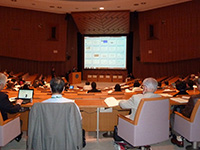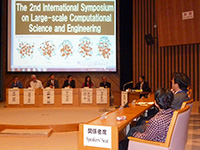

With the recent drastic improvement in the performance of computers, researchers around the world have been focusing on multi-physics phenomena, multi-scale in terms of time and space, including different physical phenomena such as earth/astronomical sciences, engineering, and the molecular/quantum science of materials/living organisms, which are now achieving new results.
In order to provide an opportunity for these results to be conveyed society, ” The 2nd International Symposium on Large-scale Computational Science and Engineering” , following the first symposium on October 17, 2011, was held in the Science Council of Japan Auditorium on Thursday, November 8, 2012, organized by the Science Council of Japan and Japan Science and Technology Agency. There were approximately 120 participants.
Of the research topics mentioned above, those related to the analysis of macro and/or micro phenomena, such as nanotechnology and biotechnology, earthquake disasters, space science and others, were focused for the symposium. A total of fifteen researchers were invited, nine from Japan, who have been leading their fields both within and outside of the country and delivered in the pre-lectures of panel discussion, and six others, who were invited from abroad and delivered in the plenary lectures. They presented cutting-edge research from their own fields on simulation fundamentals, including modeling and numerical calculation method.
The symposium clarified theories/technologies specific to each research topic, as well as some common to more than one topic. Therefore, more significant and meaningful outcomes were achieved than if only one research field had been covered. At this symposium, the way simulation technology is used and disseminated in society was also introduced, and the current situation, as well as future problems and prospects, was actively discussed.
Guest speakers from overseas presented their latest research: Dr. Mauro BOERO, Dr. Josef MICHL and Dr. Aiichiro NAKANO for nano-science and Dr. Moon Ki KIM, Dr. Karissa SANBONMATSU and Dr. Weitao YANG for bio-science.
With regards to CREST’s research area of ” High Performance Computing for Multi-scale and Multi-physics Phenomena” , nine teams presented their latest research: Dr. Masatoshi IMADA, Dr. Shuji OGATA, Dr. Hiroshi NAKATSUJI and Dr. Masataka NAGAOKA for nano-science, Dr. Yuriko AOKI, Dr. Akio KITAO and Dr. Keiji MOROKUMA for bio-science and Dr. Hideyuki USUI and Dr. Shinobu YOSHIMURA for macro science.
At the concluding session, all symposium presenters participated in the panel discussion titled ” The Future of Large-scale Computational Science and Technology” , where lively exchanges of opinions were observed relating to future problems and prospects of the EXA computer to follow the supercomputer-K.
Reference URL:
·Website
http://www.multi.jst.go.jp/topics/intl-sympo2012/
·Program
http://www.multi.jst.go.jp/topics/pdf/program121108.pdf
·Proceedings, in Japanese and then in English
http://www.multi.jst.go.jp/topics/pdf/proceedings121108.pdf
CREST
http://www.jst.go.jp/kisoken/crest/research_area/index.html
JST, an integrated organization of science and technology in Japan, establishes an infrastructure for the entire process from the creation of knowledge to the return to the society. For more information, visit http://www.jst.go.jp/EN/